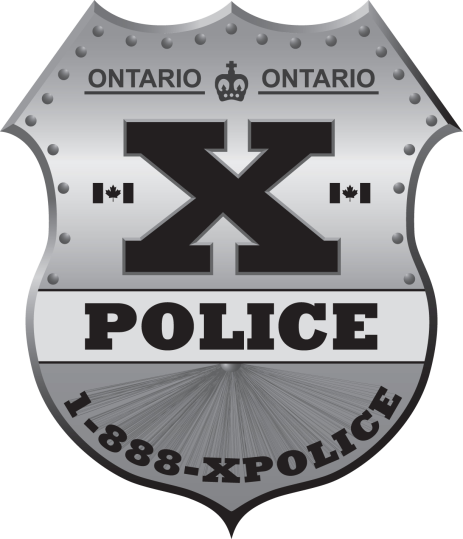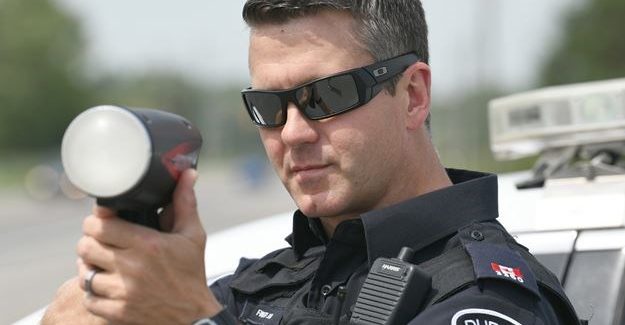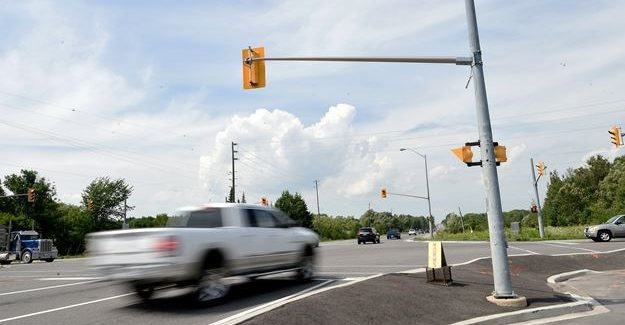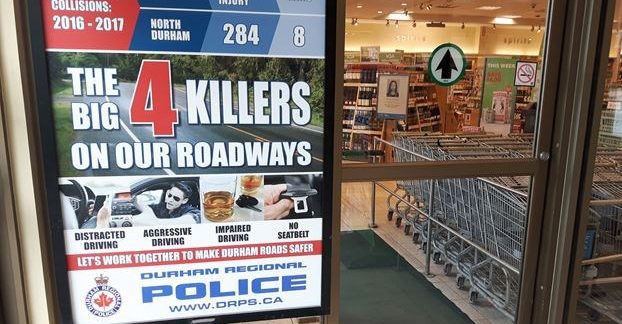Public education campaign encourages drivers to think before they act
The poster is hard to miss, its bold title writ in striking white letters — the Big Four Killers on our roadways.
The poster, which can be found at LCBOs across the region and at grocery stores and municipal buildings in north Durham, is part of a Durham Regional Police Service (DRPS) public education campaign designed to change driving behaviours before they lead to accidents, injuries, or worse.
“We wanted something that would create more enduring change than just getting a ticket,” said Const. Shawn Finley, who spearheaded the campaign through his role as chair of the north Durham traffic committee.
“When you get a ticket, that might alter your behaviour for a short period of time, say the time it takes you to think of what that ticket cost, but we wanted something to get people thinking about the controllable behaviours that contribute to the big four killers.”
Those big four include impaired driving, distracted driving, aggressive driving such as speeding, and no seatbelts, which are collectively the leading causes of traffic collisions.
According to the DRPS’s Traffic Services Branch Roadway Safety Strategy 2017-2019, one motor vehicle collision occurs every 48 minutes within Durham Region, with an average of one person injured every five hours in collisions on the region’s roads.
“We want people to think about the controllable behaviours that lead to these accidents, maybe if it’s at the forefront of their brains instead of thinking ‘Hey, I better slow down or I’ll get a ticket,’ they might think ‘Hey, I better slow down or someone might get hurt,’” Finley said.
“We’re trying to address that there’s something more fundamental in terms of the driving behaviour itself and how people perceive driving. We’re trying to make an impact and change the actual behaviours that lead to these accidents.”
Across the region since 2012 there has been a two per cent increase in personal injury collisions and a 33 per cent increase in fatal collisions. Of those fatal collisions, 37 per cent are related to distracted driving.
In 2015 DRPS laid more than 700 impaired driving charges, with 166 collisions related to impaired driving, 22 of which resulted in personal injury and four ending in fatalities. Of the more than 700 charges laid, 224 were the result of 911 calls from concerned citizens reporting suspected impaired drivers.
That same year police charged 2,705 drivers with distracted driving, issued more than 2,500 tickets for speed-related offences and charged 84 drivers with racing a motor vehicle. Despite the tickets and cautions handed out, 11 fatal collisions were linked to aggressive driving in 2015.
The Big Four campaign began in north Durham in 2015 as a two-part initiative that included the public education campaign, with posters installed at rotating community locations, and an accompanying brochure handed out to drivers receiving tickets or traffic cautions.
“Traffic concerns take up a higher percentage of our calls for service than any other division in the region,” said Staff-Sgt. Colin Shaw, of North Division.
About 35 per cent of the calls for service in North Division are traffic-related. The division also covers the largest area, in square kilometres, of any division in the region, and includes major routes to cottage country. Calls range from reporting collisions to speeding complaints, commercial vehicle concerns and just general driving complaints, which come in from citizens, from the political arena and are also posted on social media including Facebook and Twitter.
“Whatever media we get a complaint from, we want to address every complaint,” Shaw said.
In 2016 the division saw 156 motor vehicle collisions resulting in personal injury, and six that involved fatalities. In 2017 there were 128 accidents involving personal injuries, and two with fatalities.
“There’s an awful lot of traffic moving through the area, so certainly when it comes to roadway safety and the top four killers, it’s another way to get the message out there to people to refrain from these behaviours,” Shaw said.
“It’s important to educate the public so they understand texting and driving is killing people, it’s raising the possibility of an accident. We don’t want to wait for someone to have an accident before we deal with the fact they were speeding, drinking and driving or texting and driving.”
The practice of handing out a brochure with all tickets has since expanded regionwide, and the wider public education campaign, which was updated this year, could follow.
“It’s a pilot project right now,” Shaw continued.
“We’re trying to see what the success level is and how many people we’re reaching by putting these signs up.”
The initiative holds special meaning for Finley, who covers North Division in his patrol duties.
“I wanted to go into the community and do something that directly contributes to the well-being of the citizens,” he explained. “This is my patrol zone, so it’s become something developed up here, it’s unique in north Durham.”
Finley said he would be happy to see the project expand within the region if it helps drivers look at dangers in a more personal way.
“We’re trying to be innovative in our approach to something that characteristically has gone on since the beginning of driving,” he said.
“There’s always going to be that mindset that accidents will happen to someone else, not to me. We’re trying to get people to realize with these statistics that any one of those things can happen when you’re doing that driving behaviour. We want them to see it can happen, and that change needs to come from them.”
The officer said he is hopeful police will start to see that change in their future roadway statistics.
“I hope it leads to enduring change and that we create buy-in within the community,” he said.
“I want that education to lead to something that stays longer than just the effects of a traffic tickets by itself. I hope we’re helping to shape people’s driving behaviour in a positive way.”
For more information on the project, or to request a campaign poster, call Durham Regional Police at 905-579-1520.



